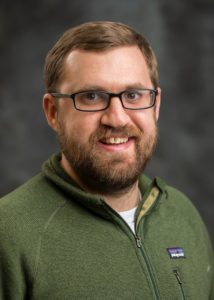We are delighted to introduce our latest Environmental Science: Processes and Impacts Emerging Investigator, Andrew Graham!
Andrew Graham is an environmental geochemist specializing in the fate of trace elements in aquatic environments. Andrew received his BA in Geology from Earlham College (2003) and a Ph.D. from the Johns Hopkins University Department of Geography and Environmental Engineering (with Ed Bouwer). From 2010-2012, Andrew was a postdoctoral fellow at the Smithsonian Environmental Research Center (with Cindy Gilmour), and began his career at Grinnell College (Grinnell, IA) as an assistant professor of chemistry in 2012. At Grinnell, Andrew teaches courses in earth system science, inorganic and environmental chemistry, geochemistry, and water resources, and maintains an active undergraduate research group.
Read his Emerging Investigators series article: “Methylmercury speciation and dimethylmercury production in sulfidic solutions” and find out more about him in the interview below:
Your recent Emerging Investigator Series paper focuses on methylmercury speciation and dimethylmercury production in sulfidic solutions. How has your research evolved from your first article to this most recent article?
The first publication from my Ph.D. work was on chromium speciation in anoxic sediments, with an emphasis on the role that acid volatile sulfides (composed of aqueous sulfide and mineral phases such as FeS) play in reducing Cr(VI) to Cr(III). Most of my work now centers on Hg biogeochemistry, but a common thread to my work has been in understanding the intersection of the biogeochemical cycles of sulfur and trace elements.
What aspect of your work are you most excited about at the moment?
I teach at a small liberal arts college, and my laboratory consists entirely of undergraduate students. Three undergraduate students (Kanzler, Leverich Trainer, and Yang) were co-authors on the paper published in ESPI. Getting to share in the process of scientific discovery with my students and mentoring them at this early stage of their scientific careers is the most exciting and rewarding part of my job. I’ve been pretty much a strict experimentalist throughout my career, and the opportunity to collaborate with computational chemist colleagues at ORNL (Lian and Parks) and PNNL (Govind) on this paper was also really exciting.
In your opinion, what is the biggest environmental concern presented by methylmercury speciation and dimethylmercury production?
Methylmercury is a potent neurotoxin that bioaccumulates and biomagnifies in aquatic foodwebs. Most of human exposure to mercury comes from eating methylmercury-contaminated fish, especially pelagic fish like tuna. In the oceans, a significant portion of the organic mercury is dimethylmercury (DMeHg), but we know relatively little about the origin and fate of DMeHg.
What do you find most challenging about your research?
Most of my energy right now is aimed at understanding element cycling in real natural systems. For example, my group is working on understanding Hg cycling in alluvial groundwaters in the Upper Mississippi River Basin. Scaling findings from controlled laboratory experiments to real systems is a challenging task.
In which upcoming conferences or events may our readers meet you?
I usually attend one or two meetings per year – the American Chemical Society National Meeting and the International Conference on Mercury as a Global Pollutant (which meets every other year).
How do you spend your spare time?
I spend most of my time outside of work with my family. My wife Lauren and I enjoy helping our twin four-year old sons explore the world.
Which profession would you choose if you were not a scientist?
If I had more discipline and more talent, I’d write literary nonfiction, in the mold of one of my favorite authors, John McPhee.
Can you share one piece of career-related advice or wisdom with other early career scientists?
My most significant scientific discoveries have occurred when I’ve asked good questions about “failed” experiments. These experiences are frustrating at the time, to be sure, but remaining open to what the data are telling you allows you to better define the limits of your knowledge or underlying assumptions.











